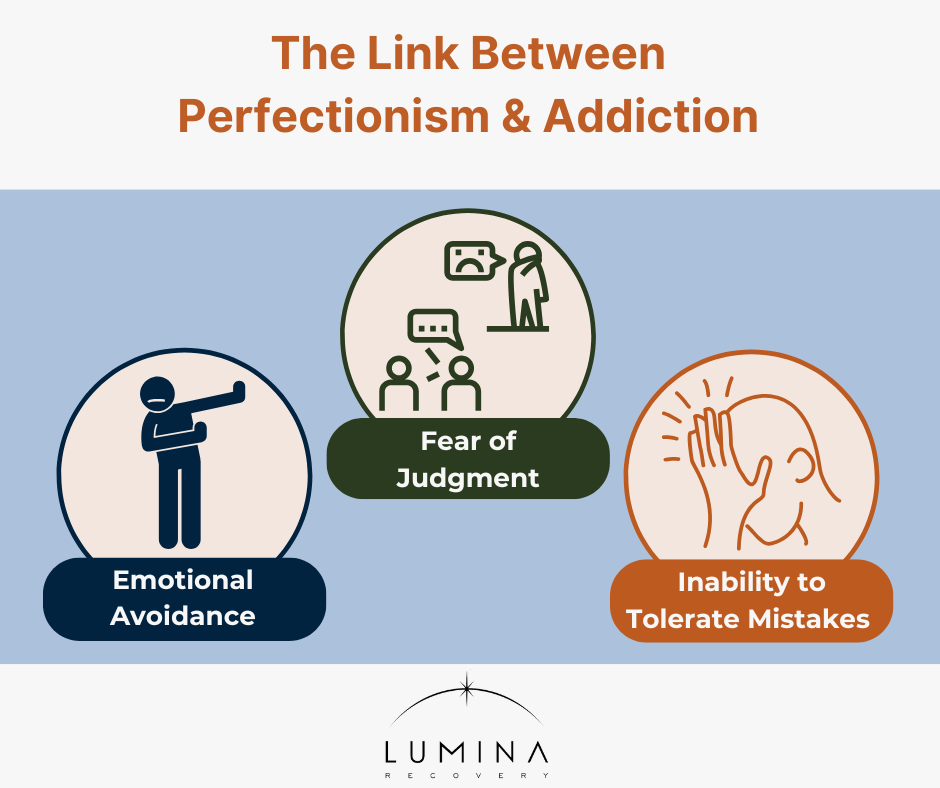Perfectionism is the tendency to set unrealistically high standards for oneself, often accompanied by harsh self-criticism when these standards are not met. Many individuals who struggle with addiction also exhibit perfectionistic traits, either before their substance use begins or as part of their recovery journey.
While striving for excellence can be a positive trait, perfectionism can contribute to stress, anxiety, and self-doubt, which may, in turn, influence both addiction and recovery processes. Recognizing the connection between perfectionism and addiction is crucial in developing a sustainable recovery plan.
What Is Perfectionism?
Perfectionism is the belief that anything short of flawlessness is unacceptable. It’s a complex psychological trait that can influence multiple aspects of a person’s life, including their self-worth, relationships, and ability to cope with challenges.
3 Types of Perfectionism
There are three main types of perfectionism, each with distinct characteristics:
- Self-Oriented Perfectionism: Imposing excessively high expectations on oneself, often leading to self-criticism and disappointment. This can include moral perfectionism, where individuals feel intense guilt or shame when they fall short of their own rigid ethical or moral standards.
- Socially Prescribed Perfectionism: The belief that others expect perfection, resulting in fear of judgment or failure. This form of perfectionism can create intense pressure to meet external standards, leading to anxiety, stress, and self-doubt.
- Other-Oriented Perfectionism: Holding others to unattainable standards, leading to frustration and strained relationships. This type of perfectionism can create tension in both personal and professional relationships, as those affected may struggle with disappointment when others do not meet their high expectations.
Psychological Impacts
Perfectionism can significantly impact mental health, increasing the risk of:
- Anxiety
- Depression
- Low self-esteem
- Feelings of inadequacy and shame
- Difficulty in accepting mistakes or setbacks

The Link Between Perfectionism and Addiction
The relentless pursuit of flawlessness can create immense emotional distress. Individuals who feel they can never meet their own or others’ expectations may turn to substances as a way to numb their stress, anxiety, or feelings of failure:
- Emotional avoidance. Perfectionists may use substances to escape overwhelming emotions like shame or inadequacy.
- Fear of judgment. The constant worry of failing in front of others can drive individuals toward substance use as a coping mechanism.
- Inability to tolerate mistakes. Perfectionists may feel that even minor missteps are unacceptable, leading to a cycle of self-punishment and addiction.
Perfectionists often experience black-and-white thinking, viewing themselves as either completely successful or entirely failing. When they feel they cannot meet their high expectations, they may use substances to escape the emotional burden of their perceived shortcomings.
The Vicious Cycle
Once addiction takes hold, perfectionism can make recovery even more challenging. The pressure to maintain unrealistic standards can create overwhelming feelings of guilt and shame, reinforcing the cycle of addiction as individuals turn to substances for escape. Here are some key ways in which perfectionism can negatively impact the recovery process:
- Increased self-criticism. A relapse or setback can trigger harsh self-judgment, further deepening the cycle of addiction.
- Struggle with acceptance. Perfectionists may find it difficult to accept the imperfection of recovery, leading to frustration and discouragement.
- Risk of relapse. If progress isn’t perceived as perfect, some may experience overwhelming guilt, making them more vulnerable to relapse.
Perfectionism During Recovery
Recovery is not a linear process, but perfectionists may struggle to accept setbacks. Common challenges include:
- Fear of failure. Worrying that any mistake or lapse means complete failure.
- Believing one can control recovery alone, leading to risky behaviors.
- Unrealistic expectations. Expecting immediate or flawless progress and becoming discouraged when setbacks occur.
- Moral perfectionism in recovery. Feeling overwhelming guilt for past mistakes and struggling to forgive oneself, which may hinder emotional growth and progress.
Because perfectionists often struggle with self-acceptance, they may experience overwhelming guilt or frustration when recovery is not perfect, increasing the risk of relapse.

Strategies to Manage Perfectionism in Recovery
Overcoming perfectionism in recovery requires a combination of self-awareness, intentional habit changes, and emotional resilience. One of the most effective approaches is cognitive behavioral therapy (CBT), which helps individuals recognize and challenge perfectionistic thought patterns.
Setting realistic goals is another key strategy. Rather than expecting immediate success, focusing on small, attainable milestones can encourage steady progress. Acknowledging achievements, no matter how minor, can foster motivation and reinforce a positive mindset.
Practicing self-compassion and mindfulness is essential in breaking free from the cycle of perfectionism. Techniques such as meditation, journaling, and positive affirmations help individuals cultivate self-acceptance. Accepting mistakes as learning opportunities rather than failures allows for a more balanced and resilient approach to recovery.
Finally, seeking support from a community plays a crucial role in managing perfectionism. Seeking therapy, joining support groups, and openly communicating with loved ones can provide essential encouragement and accountability.
Working with professionals specializing in addiction and perfectionism recovery can further equip individuals with the tools needed for lasting change.
FAQs
What is the connection between perfectionism and addiction?
Perfectionism can lead to unrealistic self-expectations, causing stress and emotional distress. Individuals may turn to substances as a coping mechanism to manage these feelings.
How does perfectionism affect the recovery process?
Perfectionistic tendencies during recovery can lead to fear of failure and unrealistic expectations, potentially increasing the risk of relapse if progress isn’t perceived as perfect.
Can perfectionism be treated alongside addiction?
Yes, addressing perfectionism is crucial in addiction treatment. Therapies like cognitive behavioral therapy (CBT) can help individuals recognize and modify perfectionistic thought patterns.
How to overcome perfectionism while in recovery?
Overcoming perfectionism involves practicing self-compassion, setting realistic goals, seeking therapy, and engaging in mindfulness practices to reduce self-judgment.
Find Help for Perfectionism and Addiction With Lumina Recovery
Perfectionism can be a significant obstacle in addiction recovery, but it doesn’t have to define your journey. By acknowledging that setbacks are part of the process, practicing self-compassion, and seeking support, individuals can build a more sustainable path to healing.
At Lumina Recovery, we offer cognitive behavioral therapy (CBT) and dual diagnosis programs designed to help individuals manage perfectionistic tendencies while overcoming addiction.
If you or a loved one is struggling, contact us today to start the journey toward recovery.


